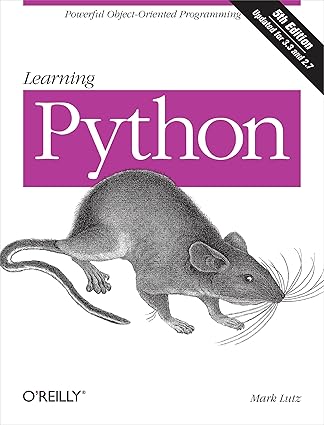Learning Python 6th Edition: A Comprehensive Guide
Introduction
"Learning Python, 6th Edition" by Mark Lutz is a comprehensive and in-depth guide to the Python programming language. This book is a valuable resource for both beginners and experienced programmers looking to enhance their Python skills.
Key Features of "Learning Python, 6th Edition"
- Comprehensive Coverage: The book covers a wide range of Python topics, from fundamental concepts like data types and control flow to advanced topics like object-oriented programming, data structures, and working with files and databases.
- Practical Examples: Numerous real-world examples and exercises help readers apply their knowledge and build practical skills.
- Clear and Concise Explanation: The book is written in a clear and concise style, making it easy to understand even for those with no prior programming experience.
- Updated for Python 3: The 6th edition is updated to cover the latest features and best practices of Python 3, ensuring readers learn the most up-to-date version of the language.
- Focus on Practical Application: The book emphasizes practical application of Python concepts through real-world examples and projects.
Key Topics Covered in "Learning Python, 6th Edition"
- Core Python Concepts: Data types, variables, operators, control flow statements (if/else, loops), functions, modules.
- Object-Oriented Programming (OOP): Classes, objects, inheritance, polymorphism, and other OOP concepts.
- Data Structures: Lists, tuples, dictionaries, sets, and their applications.
- File Handling: Reading and writing data to files.
- Exceptions and Error Handling: Handling errors and exceptions gracefully.
- Working with Databases: Interacting with databases using Python.
- Graphical User Interfaces (GUIs): Building simple GUIs using Python.
- Network Programming: Working with sockets and networking protocols.
- Web Development: Introduction to web development with Python and frameworks like Django and Flask.
Who Should Read "Learning Python, 6th Edition"?
- Beginners: This book is an excellent resource for beginners who are new to programming and want to learn Python.
- Experienced Programmers: Experienced programmers can use this book to deepen their understanding of Python and learn about advanced features.
- Students: Students in computer science and related fields can use this book as a valuable learning resource.
- Data Scientists and Analysts: Python is widely used in data science and analysis, and this book provides a strong foundation for those working in these fields.
Beyond the Book:
- Online Resources: Utilize online resources such as the official Python documentation, tutorials, and online courses to supplement your learning.
- Practice Regularly: Consistent practice is crucial for mastering any programming language. Work on small projects and gradually increase the complexity of your challenges.
- Join Online Communities: Engage with other Python learners through online forums and communities.
- Contribute to Open Source Projects: Contribute to open-source projects to gain practical experience and learn from other developers.
Conclusion
"Learning Python, 6th Edition" is a comprehensive and valuable resource for anyone looking to learn Python. By combining the book with hands-on practice and utilizing online resources, you can effectively learn Python and build a strong foundation in this powerful and versatile programming language.
Note: This information is based on the expected content of "Learning Python, 6th Edition." The actual content may vary slightly.
Disclaimer: This information is provided for general knowledge and informational purposes only. It does not constitute professional advice.



